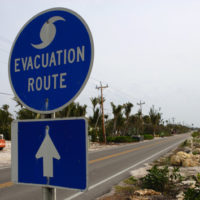
(NEW YORK) — Fleeing Hurricane Ian, Kallie Collins, her fiance and four of her children flew out of Tampa Bay on Tuesday hours before the airport halted flights. However, her fifth child, a 14-year-old boy, wasn’t on the plane with them.
Months earlier, the family had purchased plane tickets for an October visit to her parents in Minnesota. As the storm headed straight toward their Tampa Bay-area home, the airline allowed them to move up their departure date and evacuate.
But her eldest son hadn’t wanted to come along back when they scheduled the trip, and they couldn’t afford to add a ticket for him.
“Leaving your child behind in a situation like this is just horrible,” she said. “I felt so guilty.”
The family had spent all of its savings, a total $1,100, on hurricane preparations like storage for their valuables and medical supplies for her two children with special needs, Collins said. Ultimately, she found a brother-in-law who could shelter her son at his home in Jacksonville.
“With our savings depleted, plus inflation, we’re in a really, really tough financial spot,” Collins said. “I have no idea how we’re going to get through this.”
Collins is hardly the only person fleeing Hurricane Ian who faced dire financial choices in recent days.
More than 2.5 million Floridians fell under an evacuation order on Wednesday as the hurricane barreled toward the state, where 13% of people live in poverty and the median annual household income is about $58,000.
For low- and middle-income households, the costs of evacuation can force individuals to put themselves in harm’s way, go into credit card debt or rely on support from family members and charity, advocates and experts said.
“The insecurity that so many people in this country are facing — you see it play out during a hurricane,” Mechele Dickerson, a professor at the University of Texas Law School who has studied the costs of living through a hurricane, told ABC News.
“The evacuations show the same thing we saw during COVID,” she added. “As soon as everything was shut down, the disparities were on display.”
Evacuating Hurricane Ian is unaffordable for many
During Hurricane Harvey, which struck Texas and Louisiana in 2017, hurricane evacuation cost households an average of $1,200, David Bierling, a researcher at A&M’s Texas Transportation Institute and Hazard Reduction and Recovery Center, told the Texas Observer. Costs add up from transportation, lodging, food and lost wages, his research showed.
That sudden financial burden would prove out of reach for most Americans. More than half of people across the U.S. cannot afford to cover a $1,000 emergency, according to a Bankrate survey in January.
Many people cannot afford to evacuate because they lack a car and the savings to pay for alternate transportation, Dickerson said, noting the costs of staying at a hotel also exceed many household budgets.
Further, people who work for hourly wages often cannot afford to miss days or weeks of work as they shelter elsewhere, Dickerson added. “If somebody could be making money if they stay, there’s also the income component,” she said.
‘For low-income people, this is a disaster’
Still, many people have chosen to evacuate from the path of Hurricane Ian, even as they struggle to afford basic needs, said Vanessa Tinsley, the executive director of a Miami-area food bank called Bridge to Hope.
A local influx of evacuees has dramatically increased the number of people seeking food, she said.
“My phone has been ringing off the hook,” Tinsley told ABC News. “The increased need is enormous.”
Bridge to Hope, which typically provides food to 100 clients by appointment each day, saw the number of appointments shoot up to 156 on Thursday, she added. Tinsley hired two additional staff members to work the food pantry, nearly doubling a staff that usually stands at three. The heightened need will continue for at least a month, she said.
“For low-income people, this is a disaster,” she said. “The food budget is the last flexible piece they have.”
“You can’t call the bank and say, ‘I need a lower car payment,'” she added. “You can’t lower your car insurance, the cost of your housing, your utility bill.”
Jasmine King, a customer service representative for Enterprise Rent-A-Car who makes $16 per hour, evacuated from the Western coastal city of Bradenton on Tuesday night with her five children.
Staying with her kids at a hotel near the Miami airport, King faces $178 per night for lodging as she suffers lost wages from missing her job. In all, King’s savings have dwindled to $240, she said on Thursday, adding that she hopes to go home as soon as possible when the roads are navigable.
“This experience has been an eye-opener,” she told ABC News. “It’s not just the glitz and glam of living in a state like Florida, but do you have a financial backup plan if something goes wrong?”
Copyright © 2022, ABC Audio. All rights reserved.















